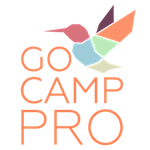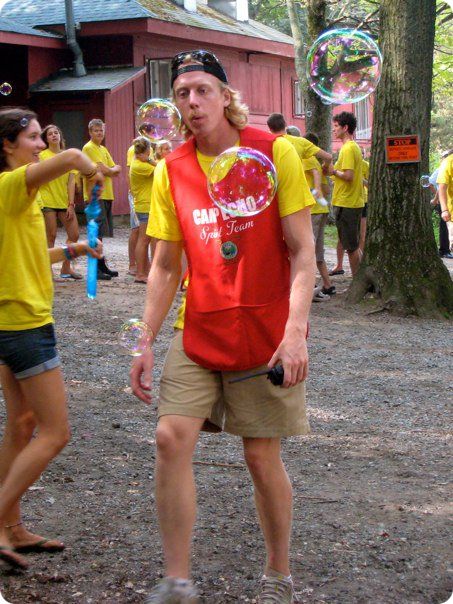Constantly Learning - An Interview with Bernard Rocca
The Summer Camp Society Interviews. This interview is the first of a series from Sarah and Jack interviewing change making camp professionals and sharing their advice because great camps have great leaders.
Bernard Rocca is the executive director of MCGAW YMCA Camp Echo. In his time as a camp professional he has boldly taken on the issue of lack of diversity in summer camp. He encourages us all to find new and creative ways to change our systems, programs, and cultures to be more inclusive. Under Bernard's leadership Camp Echo has flourished both financially and made huge strides in diversity and inclusion.
How did you get started in camping?
I came to camp the summer of 1994 when I went to camp for two weeks here at Camp Echo. It’s funny because I loved the activities but I was never into the social environment of camp. I just loved being outside, the achievement of it--learning to waterski, shoot archery, ride horses.
I left camping in high school. I wasn’t a lifer--I didn’t do all the CIT and leadership development stuff. Somehow my friends in high school had stayed in it (they were lifers), and they convinced me to come back up to camp for two weeks to volunteer in the kitchen. I learned how to wash dishes super fast so I could get more free time in between meals to go out and play frisbee and help out in activities. I realized that I was into this camp thing and stuck with it on and off ever since.
After college, I was working out in California as an engineer at the San Jose Airport. As fun as watching concrete dry was, I decided to quit my job, ski for 5 months and live out of my car, and then come back to camp for the summer...hoping it would turn into an opportunity beyond the summer. I came back in an operations management role, which is a funny role to come into. As camp counselors we never learned all of the operations/behind the scenes stuff...it turned out to be a great experience for me because I learned so much that I wouldn’t have otherwise learned, and that’s what positioned me to become a camp director.
What is something about you that makes you good at your job?
I don’t think it’s true only of camping--I think it’s something that makes people good at their jobs wherever they are--it’s a desire to learn and a constant curiosity. And a willingness to be challenged and a desire to hear other people’s ideas and learn from how other people are doing things better versus telling people how to do things better.
That’s something I’ve gotten better at over time. We play to our strengths but try to continuously learn. I can generate ideas and be innovative--that comes more naturally to me--but I’ve gotten better at building off other people’s ideas and seeing the creative value of collaboration.
What is something that was really tough for you at the beginning?
I think one of the challenges for me early on (and it’s always a challenge, but I’m getting better at it) is really stepping back from the tasks, from the million things to do, and making it a priority to find space to connect with the people of camp more, from the staff that I work with to the campers, the alumni, the parents...and being really intentional throughout the year and staying really connected with them. Volunteers...the list goes on and on.
When you think about a community like camp that has so many passionate stakeholders and constituents, it can be really hard to meet everyone where they need to be met, where they are--it’s impossible. As I’ve gotten better at that, I’ve realized and learned that you can’t please everyone all the time. And that’s hard, because camp people like to make people happy! That reality is tough, but I’ve gotten better at recognizing that and making sure we’re giving people opportunities to stay engaged.
The other thing is just dealing with the really stressful situations when things go wrong because they invariably happen. Unfortunately it’s something that’s just learned from experience. Each time you go through a really tough situation at camp, the next one doesn’t seem as bad or you’re a little more prepared to take it on, even if it’s not exactly the same challenge.
What is something you or your camp are working on getting better at right now?
Being truly inclusive. I think in summer camp, we as an industry have a history of being somewhat passively inclusive and presuming that our best intentions and general friendliness creates an environment that all people can and should thrive in. But the reality as I have come to see it is that camp has historically been (and is still in most cases) fairly exclusive to those who do not fit the traditional camp mold, be it racially, physically, socio-economically, or in any other dimension of diversity.
So, I am focusing on asking others different than myself about their camp experiences, practicing cultural humility to make camp more intentionally inclusive, and trying to build the change capacity within our community to be able to support the inevitable evolution of camp that will be necessary to achieve that level of inclusion.
What keeps you going?
Access to the walk-in cooler!
No, let’s see. I’m really fortunate in my camp setting and the Camp Echo structure that I spend the other eight months of the year back in the community we serve in Evanston. Inevitably, when I walk down the street in the afternoon or go to get a slice of pizza at Gigio’s, I’ll pass by kids who see me and immediately get excited--not because they particularly like me, but because I represent camp and camp is a place that makes them happy.
And those moments of seeing the impact directly on kids and knowing that we are changing lives, and know that with each passing month, day, hour, news story on CNN, that camp has become more and more important to the kids in our world because the rest of the world is getting harder and harder for them.
That was a really long way of saying that we change lives.
What is your advice for someone who is a new camp pro?
Whether or not you’ve been at one camp your entire life and you’re still there or you’ve bounced around to camps all over the place, take the time to really critically analyze your programs and reflect continuously. And constantly ask other people about their experiences at camp, because oftentimes we can learn the most about camp from asking other people both what they love about it and what they have struggled with it at camp, and that will help us understand how we can make camp better for everyone.
The Summer Camp Society is a semester-long learning cooperative designed and facilitated by Sarah Kurtz McKinnon and Jack Schott. We empower emerging leaders to give all kids the best possible camp experience. Learn more.
TAKE YOUR CAREER TO THE NEXT LEVEL


